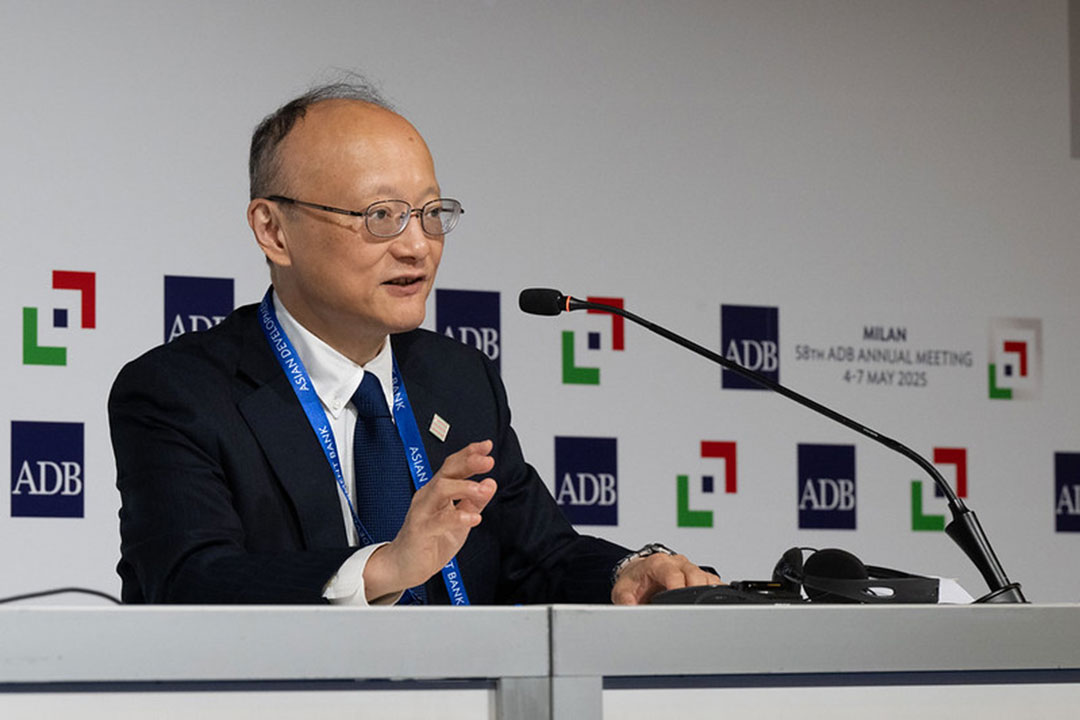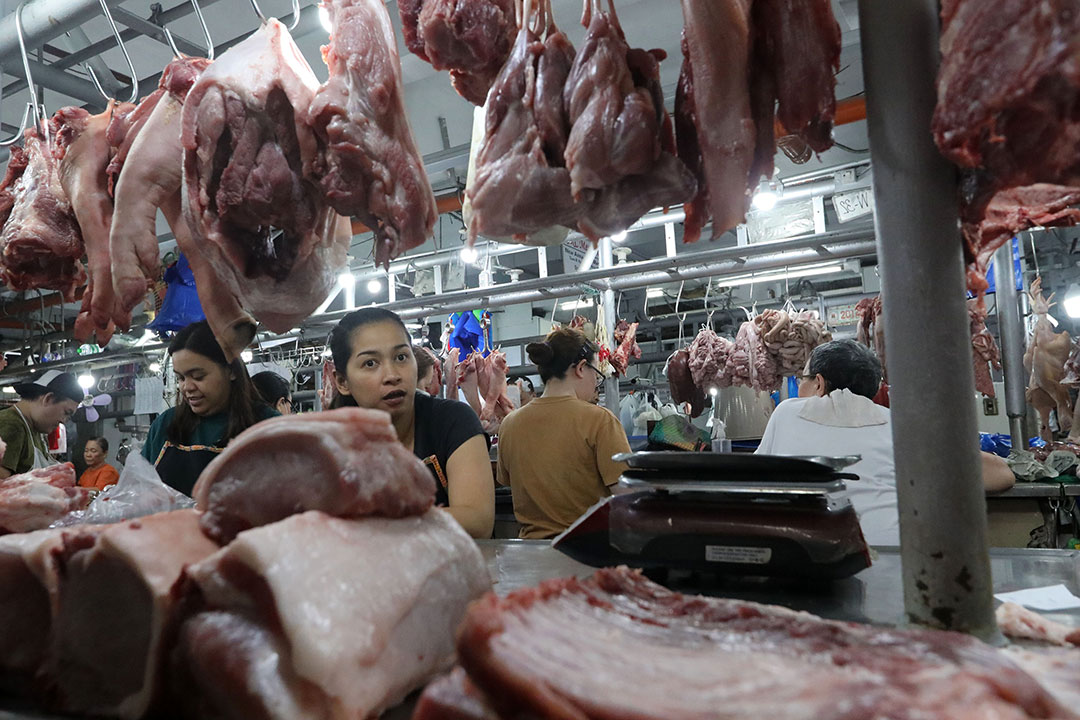
Upgrade to High-Speed Internet for only ₱1499/month!
Enjoy up to 100 Mbps fiber broadband, perfect for browsing, streaming, and gaming.
Visit Suniway.ph to learn
 Asian Development Bank (ADB) President Masato Kanda holds a press conference during the 58th Annual Meeting of the ADB Board of Governors in Milan, Italy. — ASIAN DEVELOPMENT BANK
Asian Development Bank (ADB) President Masato Kanda holds a press conference during the 58th Annual Meeting of the ADB Board of Governors in Milan, Italy. — ASIAN DEVELOPMENT BANKBy Luisa Maria Jacinta C. Jocson, Senior Reporter
MILAN, Italy — The Asian Development Bank’s (ADB) top official said the Asia-Pacific (APAC) region must evolve to be able to withstand the shocks from tariff policies.
“Given this unprecedented uncertainty, you can’t be complacent,” ADB President Masato Kanda said during a press conference here on Sunday.
“I believe this is a good opportunity for Asian and Pacific countries to turn these challenges into the opportunity to make their economies more resilient, stronger, open and interconnected in the region and with their new partners.”
Mr. Kanda said these economies must “continue the reform path.”
“It is changing day by day. So, it’s hard to see what will happen. But for Asian countries, they are relatively exposed to these issues because they have benefited from the open trade system.”
“But I think if you compare to the past, such as the Asian financial crisis, the regional countries are much stronger,” he added.
The 58th Annual Meeting of the ADB Board of Governors is being held in Italy for the first time at a time of growing uncertainty for the global economy.
In its latest Asian Development Outlook, the ADB expects developing Asia to grow by 4.9% this year and 4.7% next year. However, these forecasts do not yet take into account the US reciprocal tariffs which are on hold until July.
Countries must implement economic policies that safeguard and sustain stability, as well as enhance regional connectivity, Mr. Kanda said.
At the opening session of the Annual Meeting of the ADB Board of Governors on Monday, Mr. Kanda reiterated the need to press forward despite the uncertainty.
“Uncertainty is not a reason for retreat. It is a call for action. It challenges us to be bolder, to move faster, and to work more closely than ever before,” he said in his speech.
“We must seize the opportunity to transform lives and build a brighter future for the next generation.”
The Asia-Pacific region is “rich with potential,” he said, which can be transformed to lasting progress with the right actions.
“We are at a critical juncture in history and there is no textbook for this situation. We must recognize that we don’t have all the answers. But we are not starting from zero.”
“Growth remains solid, driven by strong domestic demand. Trade and economic integration are deepening, not only within the region but with key partners here in Europe and around the world.”
Mr. Kanda cited four areas that will be crucial to address, including the vulnerability of food systems; the digital divide; the need for sustainable energy systems; and rising sea levels and other severe weather conditions.
Meanwhile, Bank of Italy Fabio Panetta likewise warned of the spillover effects of these restrictive tariff policies.
“Protectionism now threatens to undo these achievements and weaken the very fabric of global prosperity,” he said.
“Until the recent resurgence of trade tariffs, the Asia-Pacific region was on a path of steady growth, with inflation gradually easing.”
Mr. Panetta said the Asia-Pacific is the “most dynamic region” in the world, but flagged risks from rising trade barriers and policy uncertainty.
“These risks are acute for Asia-Pacific, but they also affect Europe, where external demand plays a crucial role in sustaining growth.”
“In this context, preserving economic integration and reinforcing international cooperation are not optional. They are essential. Multilateral institutions play a pivotal role in safeguarding openness, stability, and the shared roots that underpin global prosperity,” Mr. Panetta added.
Italian Minister of Economy and Finance Giancarlo Giorgetti also cited the need for “strong and coordinated policy actions” that are aimed at a “clearer, more stable, and predictable trading environment.”
“Enhanced collaboration would support higher and sustainable long-term economic growth, averting the downside risks and mitigating the possible consequences.”
“At the same time, it might be time to rethink globalization as we know it. While it might be true that the global economy has benefited from trade and labor relations, it is also true that the fruits of this process have not always been evenly distributed among nations, and among the various production factors within each nation.”
ADB SUPPORT
Amid these uncertainties, Mr. Kanda said the ADB stands ready to extend support to its member nations to help them cope with these shifting global trade dynamics.
“ADB is quite willing to support countries and people to protect them from these external shocks. As a result, we help them to make the economy stronger, sustainable, and inclusive.”
He cited several instruments that the multilateral institution can use to support countries, such as countercyclical financial assistance or debt management support.
“Also, we have the trade and supply chain enhancement program, which will help the trade flows and the supply chains in the region.”
The ADB will help developing countries “to reform to a more diversified economy,” Mr. Kanda said.
“We have created $100 billion in additional headroom, which we will allow us to grow our operations by 50% over the next decade — from $24 billion to $36 billion dollars a year — to meet the rising aspirations of our developing member countries.”
The ADB earlier announced that it ramped up its funding to boost food security in Asia and the Pacific to $40 billion up until 2030.
In the region, almost two billion people lack access to a nutritious diet. Developing Asia accounts for more than half of the world’s hungry population.
“At the same time, we are investing deeply in digitalization. Access to reliable, affordable, and secure digital services is a foundation for opportunity,” he said.
“ADB’s support for digital technologies is helping millions access formal financial services, modernizing payment platforms, and introducing national digital IDs in the Pacific and beyond to reduce costs, improve transparency, and strengthen trust.”
The multilateral bank is also working to commit up to $10 billion for the ASEAN Power Grid, which will “modernize and interconnect energy systems across fast-growing Southeast Asian economies.”




